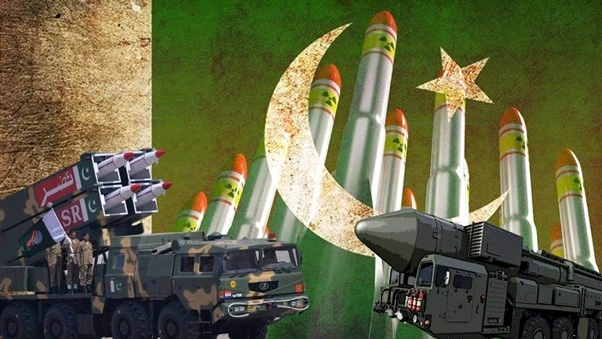Remarks by Meir Masri on the nuclear program in Pakistan are both, irresponsible and lethally out of touch with geopolitical and strategic realities in South Asia and the international security system as a whole. To portray Pakistan as a nuclear aggressive state is fact misrepresentation and a disservice to years of involving prudence that Pakistan has portrayed in the field of nuclear safety and deterrence. Contrary to the numbers advanced by alarmists, the Pakistan nuclear policy is a steady-handed stabilizing factor in the unstable region that is most carefully administered and institutionally solid about ensuring peace through deterrence.
Pakistan can never be a rogue state, not an outlier state, but rather a responsible nuclear power. It ought to be noted that the development of nuclear program in Pakistan came about due to strategic compulsions rather than ambitions or even hegemonism schemes. Confronted with a nuclear equipped neighbour, Pakistan, and a history of hostilities in its relations with India, had to build their own bomb to ensure protection of their sovereignty and to create a balance of power in the region. Pakistan has been exercising self-restraint and maturity in the handling of its nuclear assets since holding its nuclear tests in the year 1998.
International standards of command and control, oversight and civilian control NCA The National Command Authority has a strong command and control structure that is internationally consistent with the standards of oversight, transparency, and civilian control. All intricacies of nuclear policy in the country are exercised at the national command authority levels. Quite on the contrary, the nuclear Pakistani establishment is composed and centralized and is determined to ward off proliferation or misuse.
Besides, the Pakistani connection with the international norms on nuclear deserves recognition. Pakistan, which is not a signatory of the Treaty on the Non-Proliferation of Nuclear Weapons (NPT), which follows in large part, the discriminatory character of the treaty, has been cooperative with International Atomic Energy Agency (IAEA). It has embraced global bests in the sense of nuclear material and facility security. Pakistan complies with the standards of both the Nuclear Suppliers Group (NSG) and the Missile Technology Control Regime (MTCR) to the specifications similar to what can be done by a non-member.
It has implemented an extensive export control regime in line with international standards and pipelined concrete steps towards enhancing nuclear safety that include the cooperation of global institutions towards ensuring effective technical security systems. Those attempts have won Pakistan a backhand admiration as a sound custodian of nuclear power among some shed silent nuclear experts and policymakers including much of the Western world.
The nuclear Islam goes far beyond being a simple approximation to Pakistan and it is actually being equated improperly with the nuclear stance of Iran. The Iranian nuclear program has been subjected to international questioning because of the transparency of the program and its potential dual use. Conversely, the nuclear doctrine of Pakistan comes out in a concise way, which consists of minimum credible deterrence or deterrence to prevent aggression and hence stability in the region.
Pakistan does not have an ideological or a missionary nuclear policy. It is neither involved in destabilization covert operations nor does it have an ambition of acquiring nuclear might outside its national boundaries. Grouping Pakistan and Iran in the same bracket denies the fact that the two nations differ in intent, ability, and transparency in the general manner.
Weakening of the nuclear program in Pakistan will have a devastating destabilizing affect not only on South Asia but also on international strategic stability. The impact of any action that aims at destroying the nuclear weapon of Pakistan or neutralizing it would reach a domino effect of negative events. This would most assuredly trigger a fresh round of arming in the South and Central Asia regions as well with other regional nations evaluating their nuclear red lines.
It may stimulate Pakistan to go even more in-depth in search of strategic partnerships with other powers, especially those who believe that they are a similar target of Western double standards. The most terrifying part would be the fact that it would practically kill what little it has of global non-proliferation regime. By treating a responsible nuclear state such as Pakistan as a pariah whilst the country stays within the international norms, then it gives a message that the international system is politics rather than principles.
The rhetoric targeted at Pakistan over the subject of nuclear capability is thus not only irresponsible but also inflammatory. The threat to carry out a dismantling/neutralizing the nuclear deterrent of Pakistan should be kept in mind by those who postulate it should be dismantled or neutralised. This is the main pillar of national defence, strategic independence and national existence in a turbulent regional environment of Pakistan. Any need to twist arms on this front will not be taken as a mere attempt of putting on pressure to India and will be perceived as a direct challenge to Pakistan sovereignty and national security. And against such threat there will be a responsive answer such as there always has been.
The Pakistani nuclear program is not the scourge that some want to make it sound like. It is a responsible, well-managed and balancing force in a complicated geopolitical neighbourhood. Pakistan has done more than talk that it too is a nation that believes in the concept of deterrence rather than aggression; in the concept of security rather than proliferation. The international community should consider such a situation instead of falling into the trap of the stories based on the strategic or ideological partiality. A solution in the issue that peace in South Asia, and by extension the world can be achieved not by taking down the deterrent of Pakistan, but rather acknowledging it as a responsible participant in the global nuclear regime.







